An Analysis of Nursing Ethical, Professional, and Legal Considerations
VerifiedAdded on 2022/08/27
|7
|1527
|38
Essay
AI Summary
This essay meticulously analyzes the ethical, professional, and legal considerations that guide nurses in their practice. It explores the importance of adhering to ethical principles such as beneficence and justice, alongside legal requirements like patient privacy and confidentiality. The essay examines the implications of boundary violations, particularly in the context of a nurse-patient relationship, and emphasizes the need for nurses to maintain professional boundaries to ensure patient safety and quality care. It highlights the potential consequences of professional misconduct, including legal repercussions, and underscores the significance of ethical decision-making in all aspects of nursing practice. The essay uses a case study to illustrate how deviations from these considerations can compromise patient well-being and lead to breaches of professional standards. It concludes by reiterating the necessity for nurses to consistently uphold ethical, legal, and professional standards to provide optimal patient care and avoid potential harm.
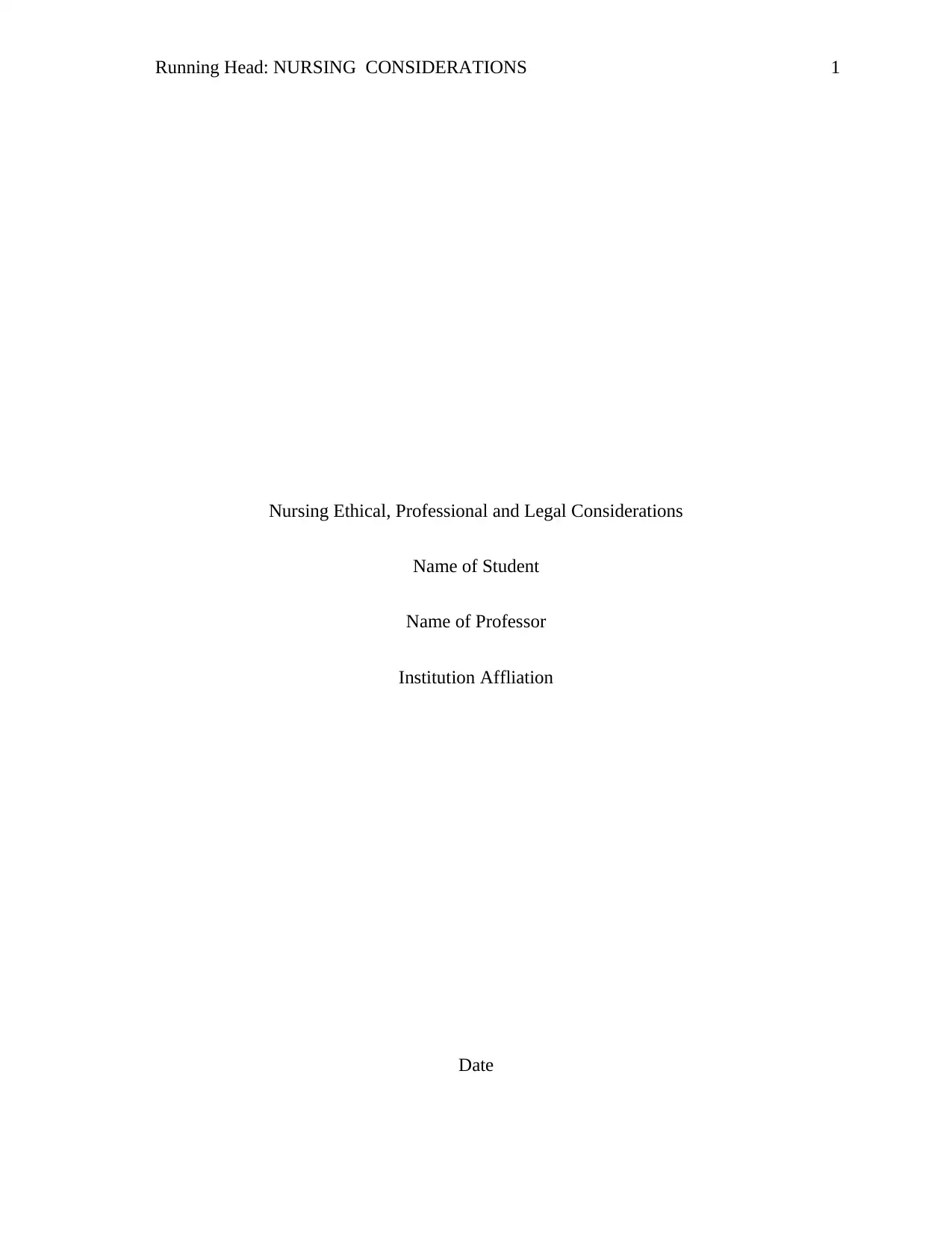
Running Head: NURSING CONSIDERATIONS 1
Nursing Ethical, Professional and Legal Considerations
Name of Student
Name of Professor
Institution Affliation
Date
Nursing Ethical, Professional and Legal Considerations
Name of Student
Name of Professor
Institution Affliation
Date
Paraphrase This Document
Need a fresh take? Get an instant paraphrase of this document with our AI Paraphraser
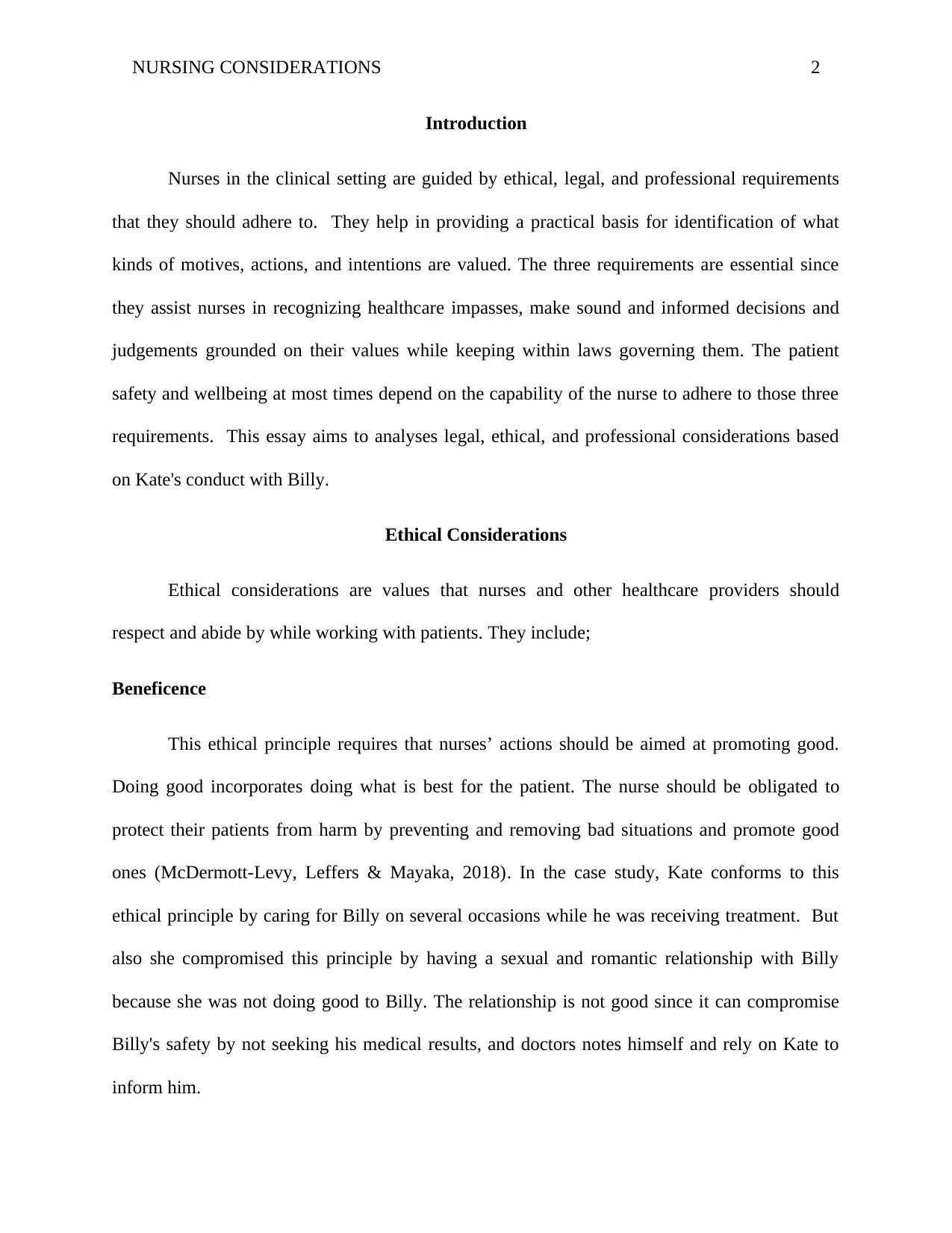
NURSING CONSIDERATIONS 2
Introduction
Nurses in the clinical setting are guided by ethical, legal, and professional requirements
that they should adhere to. They help in providing a practical basis for identification of what
kinds of motives, actions, and intentions are valued. The three requirements are essential since
they assist nurses in recognizing healthcare impasses, make sound and informed decisions and
judgements grounded on their values while keeping within laws governing them. The patient
safety and wellbeing at most times depend on the capability of the nurse to adhere to those three
requirements. This essay aims to analyses legal, ethical, and professional considerations based
on Kate's conduct with Billy.
Ethical Considerations
Ethical considerations are values that nurses and other healthcare providers should
respect and abide by while working with patients. They include;
Beneficence
This ethical principle requires that nurses’ actions should be aimed at promoting good.
Doing good incorporates doing what is best for the patient. The nurse should be obligated to
protect their patients from harm by preventing and removing bad situations and promote good
ones (McDermott-Levy, Leffers & Mayaka, 2018). In the case study, Kate conforms to this
ethical principle by caring for Billy on several occasions while he was receiving treatment. But
also she compromised this principle by having a sexual and romantic relationship with Billy
because she was not doing good to Billy. The relationship is not good since it can compromise
Billy's safety by not seeking his medical results, and doctors notes himself and rely on Kate to
inform him.
Introduction
Nurses in the clinical setting are guided by ethical, legal, and professional requirements
that they should adhere to. They help in providing a practical basis for identification of what
kinds of motives, actions, and intentions are valued. The three requirements are essential since
they assist nurses in recognizing healthcare impasses, make sound and informed decisions and
judgements grounded on their values while keeping within laws governing them. The patient
safety and wellbeing at most times depend on the capability of the nurse to adhere to those three
requirements. This essay aims to analyses legal, ethical, and professional considerations based
on Kate's conduct with Billy.
Ethical Considerations
Ethical considerations are values that nurses and other healthcare providers should
respect and abide by while working with patients. They include;
Beneficence
This ethical principle requires that nurses’ actions should be aimed at promoting good.
Doing good incorporates doing what is best for the patient. The nurse should be obligated to
protect their patients from harm by preventing and removing bad situations and promote good
ones (McDermott-Levy, Leffers & Mayaka, 2018). In the case study, Kate conforms to this
ethical principle by caring for Billy on several occasions while he was receiving treatment. But
also she compromised this principle by having a sexual and romantic relationship with Billy
because she was not doing good to Billy. The relationship is not good since it can compromise
Billy's safety by not seeking his medical results, and doctors notes himself and rely on Kate to
inform him.
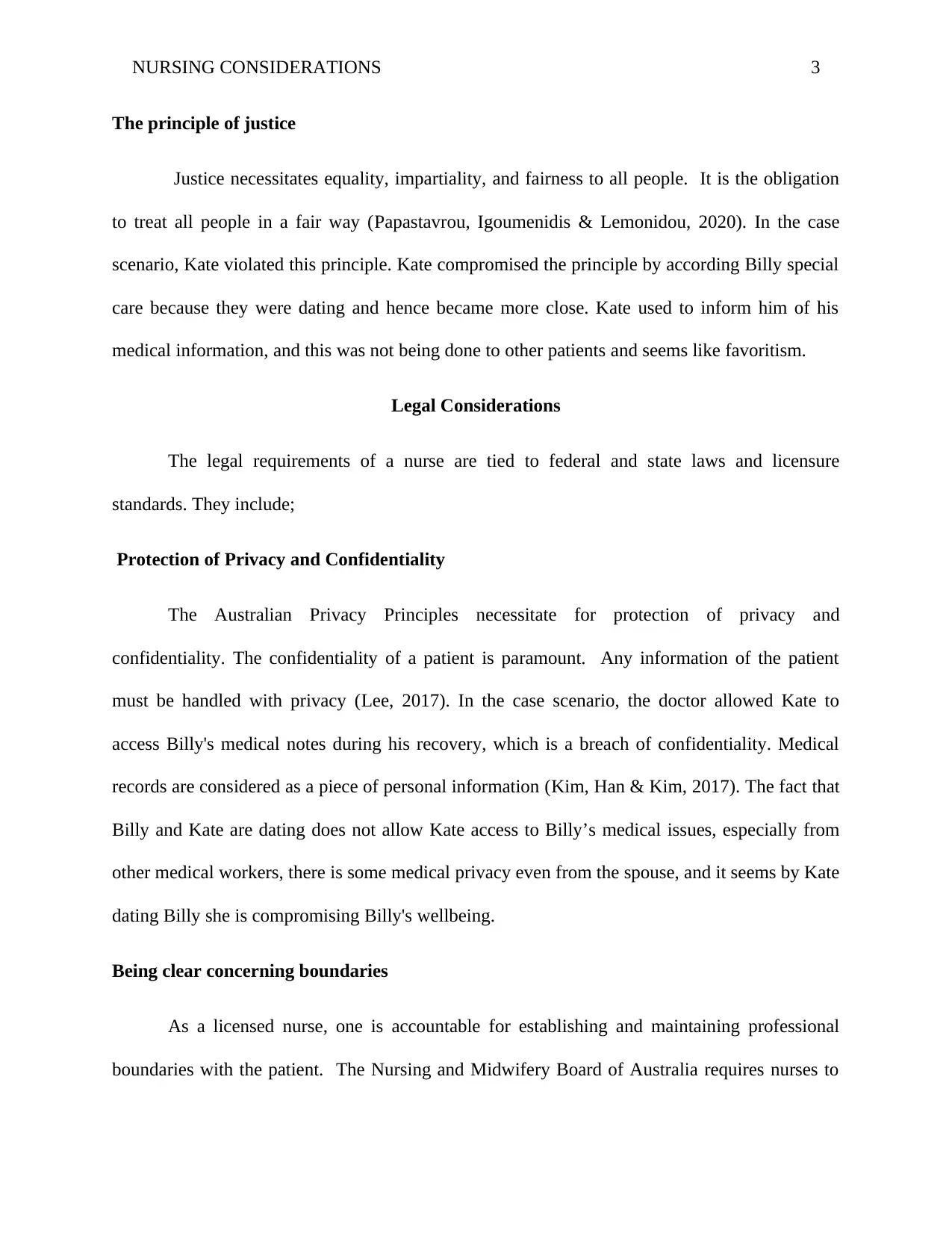
NURSING CONSIDERATIONS 3
The principle of justice
Justice necessitates equality, impartiality, and fairness to all people. It is the obligation
to treat all people in a fair way (Papastavrou, Igoumenidis & Lemonidou, 2020). In the case
scenario, Kate violated this principle. Kate compromised the principle by according Billy special
care because they were dating and hence became more close. Kate used to inform him of his
medical information, and this was not being done to other patients and seems like favoritism.
Legal Considerations
The legal requirements of a nurse are tied to federal and state laws and licensure
standards. They include;
Protection of Privacy and Confidentiality
The Australian Privacy Principles necessitate for protection of privacy and
confidentiality. The confidentiality of a patient is paramount. Any information of the patient
must be handled with privacy (Lee, 2017). In the case scenario, the doctor allowed Kate to
access Billy's medical notes during his recovery, which is a breach of confidentiality. Medical
records are considered as a piece of personal information (Kim, Han & Kim, 2017). The fact that
Billy and Kate are dating does not allow Kate access to Billy’s medical issues, especially from
other medical workers, there is some medical privacy even from the spouse, and it seems by Kate
dating Billy she is compromising Billy's wellbeing.
Being clear concerning boundaries
As a licensed nurse, one is accountable for establishing and maintaining professional
boundaries with the patient. The Nursing and Midwifery Board of Australia requires nurses to
The principle of justice
Justice necessitates equality, impartiality, and fairness to all people. It is the obligation
to treat all people in a fair way (Papastavrou, Igoumenidis & Lemonidou, 2020). In the case
scenario, Kate violated this principle. Kate compromised the principle by according Billy special
care because they were dating and hence became more close. Kate used to inform him of his
medical information, and this was not being done to other patients and seems like favoritism.
Legal Considerations
The legal requirements of a nurse are tied to federal and state laws and licensure
standards. They include;
Protection of Privacy and Confidentiality
The Australian Privacy Principles necessitate for protection of privacy and
confidentiality. The confidentiality of a patient is paramount. Any information of the patient
must be handled with privacy (Lee, 2017). In the case scenario, the doctor allowed Kate to
access Billy's medical notes during his recovery, which is a breach of confidentiality. Medical
records are considered as a piece of personal information (Kim, Han & Kim, 2017). The fact that
Billy and Kate are dating does not allow Kate access to Billy’s medical issues, especially from
other medical workers, there is some medical privacy even from the spouse, and it seems by Kate
dating Billy she is compromising Billy's wellbeing.
Being clear concerning boundaries
As a licensed nurse, one is accountable for establishing and maintaining professional
boundaries with the patient. The Nursing and Midwifery Board of Australia requires nurses to
⊘ This is a preview!⊘
Do you want full access?
Subscribe today to unlock all pages.

Trusted by 1+ million students worldwide
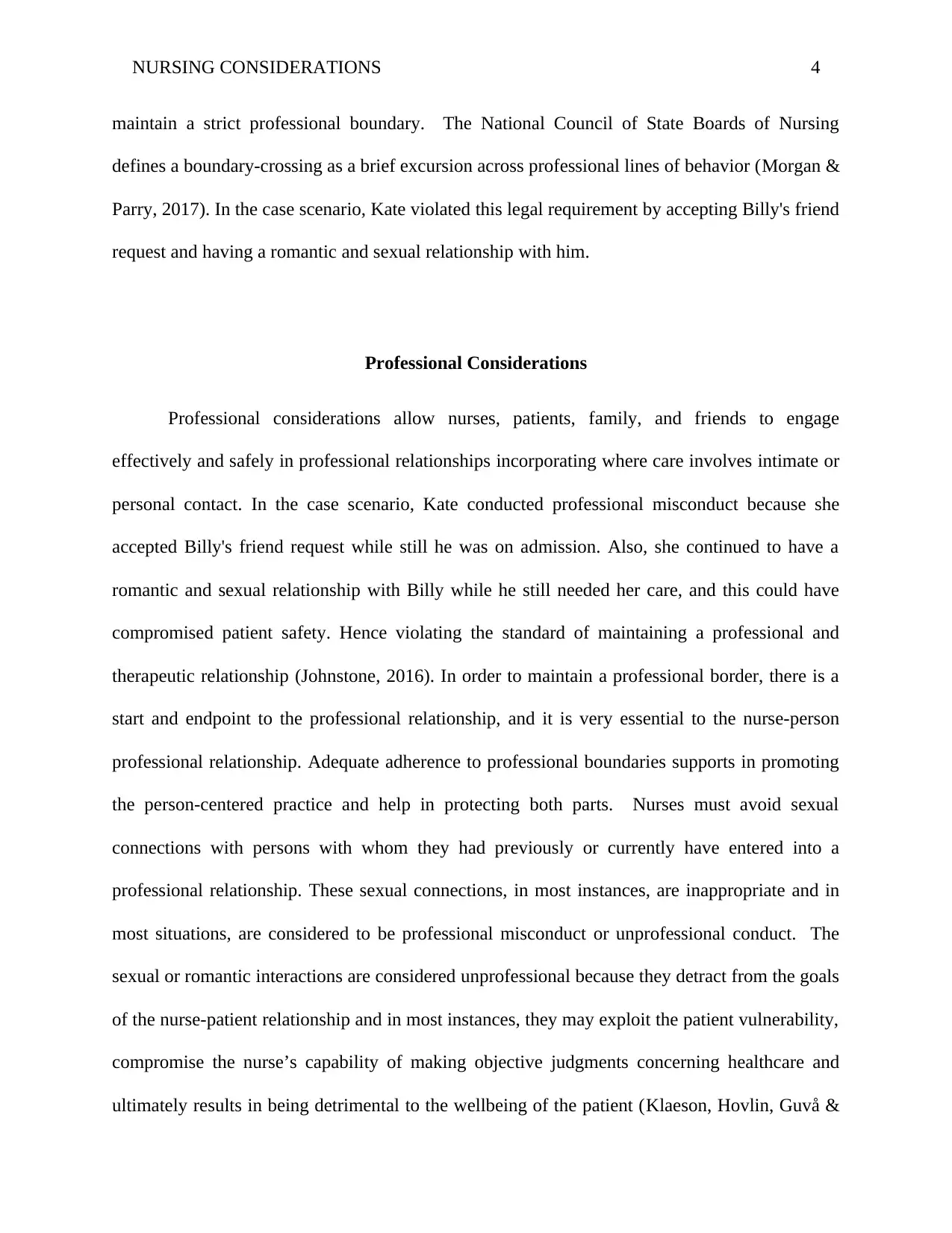
NURSING CONSIDERATIONS 4
maintain a strict professional boundary. The National Council of State Boards of Nursing
defines a boundary-crossing as a brief excursion across professional lines of behavior (Morgan &
Parry, 2017). In the case scenario, Kate violated this legal requirement by accepting Billy's friend
request and having a romantic and sexual relationship with him.
Professional Considerations
Professional considerations allow nurses, patients, family, and friends to engage
effectively and safely in professional relationships incorporating where care involves intimate or
personal contact. In the case scenario, Kate conducted professional misconduct because she
accepted Billy's friend request while still he was on admission. Also, she continued to have a
romantic and sexual relationship with Billy while he still needed her care, and this could have
compromised patient safety. Hence violating the standard of maintaining a professional and
therapeutic relationship (Johnstone, 2016). In order to maintain a professional border, there is a
start and endpoint to the professional relationship, and it is very essential to the nurse-person
professional relationship. Adequate adherence to professional boundaries supports in promoting
the person-centered practice and help in protecting both parts. Nurses must avoid sexual
connections with persons with whom they had previously or currently have entered into a
professional relationship. These sexual connections, in most instances, are inappropriate and in
most situations, are considered to be professional misconduct or unprofessional conduct. The
sexual or romantic interactions are considered unprofessional because they detract from the goals
of the nurse-patient relationship and in most instances, they may exploit the patient vulnerability,
compromise the nurse’s capability of making objective judgments concerning healthcare and
ultimately results in being detrimental to the wellbeing of the patient (Klaeson, Hovlin, Guvå &
maintain a strict professional boundary. The National Council of State Boards of Nursing
defines a boundary-crossing as a brief excursion across professional lines of behavior (Morgan &
Parry, 2017). In the case scenario, Kate violated this legal requirement by accepting Billy's friend
request and having a romantic and sexual relationship with him.
Professional Considerations
Professional considerations allow nurses, patients, family, and friends to engage
effectively and safely in professional relationships incorporating where care involves intimate or
personal contact. In the case scenario, Kate conducted professional misconduct because she
accepted Billy's friend request while still he was on admission. Also, she continued to have a
romantic and sexual relationship with Billy while he still needed her care, and this could have
compromised patient safety. Hence violating the standard of maintaining a professional and
therapeutic relationship (Johnstone, 2016). In order to maintain a professional border, there is a
start and endpoint to the professional relationship, and it is very essential to the nurse-person
professional relationship. Adequate adherence to professional boundaries supports in promoting
the person-centered practice and help in protecting both parts. Nurses must avoid sexual
connections with persons with whom they had previously or currently have entered into a
professional relationship. These sexual connections, in most instances, are inappropriate and in
most situations, are considered to be professional misconduct or unprofessional conduct. The
sexual or romantic interactions are considered unprofessional because they detract from the goals
of the nurse-patient relationship and in most instances, they may exploit the patient vulnerability,
compromise the nurse’s capability of making objective judgments concerning healthcare and
ultimately results in being detrimental to the wellbeing of the patient (Klaeson, Hovlin, Guvå &
Paraphrase This Document
Need a fresh take? Get an instant paraphrase of this document with our AI Paraphraser
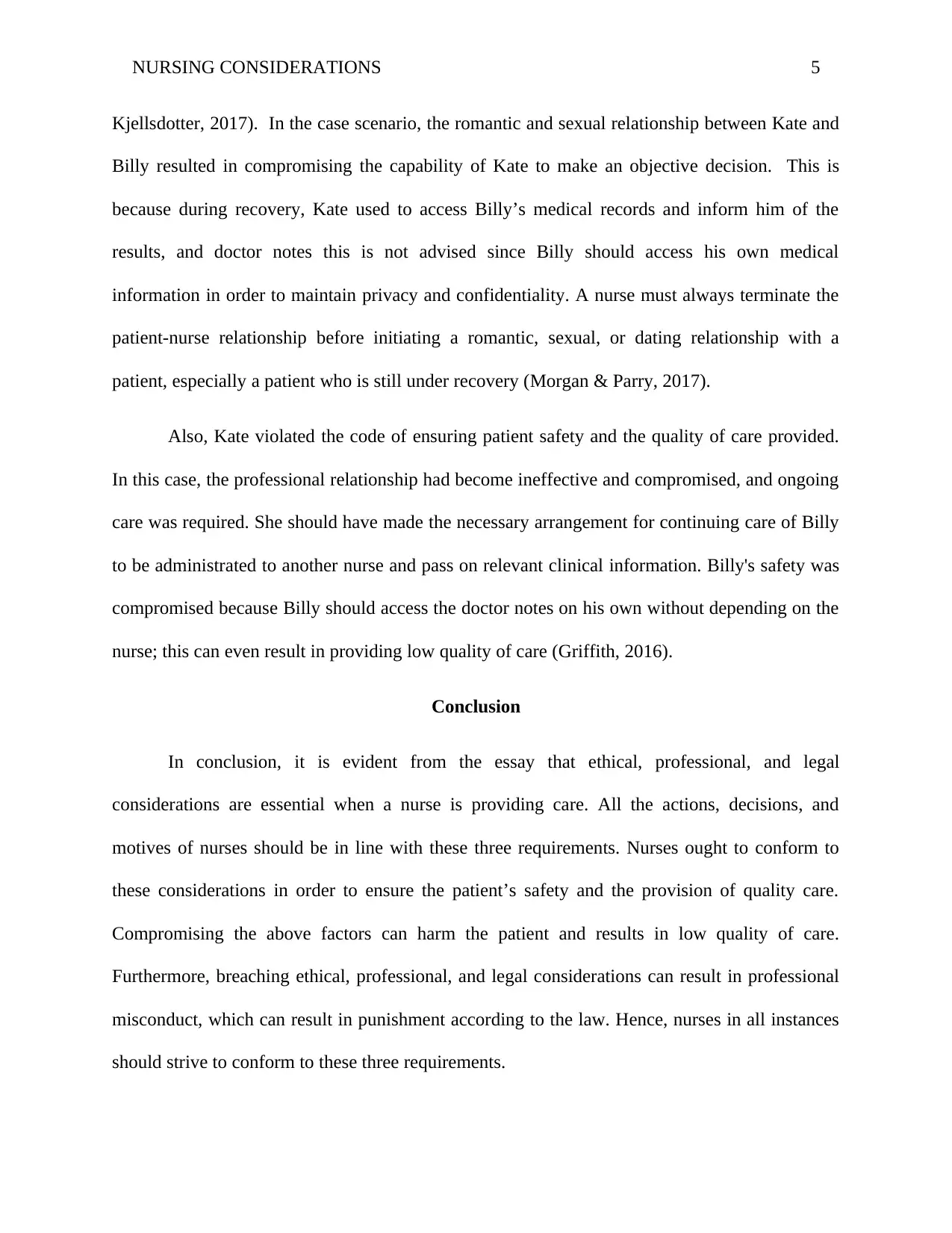
NURSING CONSIDERATIONS 5
Kjellsdotter, 2017). In the case scenario, the romantic and sexual relationship between Kate and
Billy resulted in compromising the capability of Kate to make an objective decision. This is
because during recovery, Kate used to access Billy’s medical records and inform him of the
results, and doctor notes this is not advised since Billy should access his own medical
information in order to maintain privacy and confidentiality. A nurse must always terminate the
patient-nurse relationship before initiating a romantic, sexual, or dating relationship with a
patient, especially a patient who is still under recovery (Morgan & Parry, 2017).
Also, Kate violated the code of ensuring patient safety and the quality of care provided.
In this case, the professional relationship had become ineffective and compromised, and ongoing
care was required. She should have made the necessary arrangement for continuing care of Billy
to be administrated to another nurse and pass on relevant clinical information. Billy's safety was
compromised because Billy should access the doctor notes on his own without depending on the
nurse; this can even result in providing low quality of care (Griffith, 2016).
Conclusion
In conclusion, it is evident from the essay that ethical, professional, and legal
considerations are essential when a nurse is providing care. All the actions, decisions, and
motives of nurses should be in line with these three requirements. Nurses ought to conform to
these considerations in order to ensure the patient’s safety and the provision of quality care.
Compromising the above factors can harm the patient and results in low quality of care.
Furthermore, breaching ethical, professional, and legal considerations can result in professional
misconduct, which can result in punishment according to the law. Hence, nurses in all instances
should strive to conform to these three requirements.
Kjellsdotter, 2017). In the case scenario, the romantic and sexual relationship between Kate and
Billy resulted in compromising the capability of Kate to make an objective decision. This is
because during recovery, Kate used to access Billy’s medical records and inform him of the
results, and doctor notes this is not advised since Billy should access his own medical
information in order to maintain privacy and confidentiality. A nurse must always terminate the
patient-nurse relationship before initiating a romantic, sexual, or dating relationship with a
patient, especially a patient who is still under recovery (Morgan & Parry, 2017).
Also, Kate violated the code of ensuring patient safety and the quality of care provided.
In this case, the professional relationship had become ineffective and compromised, and ongoing
care was required. She should have made the necessary arrangement for continuing care of Billy
to be administrated to another nurse and pass on relevant clinical information. Billy's safety was
compromised because Billy should access the doctor notes on his own without depending on the
nurse; this can even result in providing low quality of care (Griffith, 2016).
Conclusion
In conclusion, it is evident from the essay that ethical, professional, and legal
considerations are essential when a nurse is providing care. All the actions, decisions, and
motives of nurses should be in line with these three requirements. Nurses ought to conform to
these considerations in order to ensure the patient’s safety and the provision of quality care.
Compromising the above factors can harm the patient and results in low quality of care.
Furthermore, breaching ethical, professional, and legal considerations can result in professional
misconduct, which can result in punishment according to the law. Hence, nurses in all instances
should strive to conform to these three requirements.
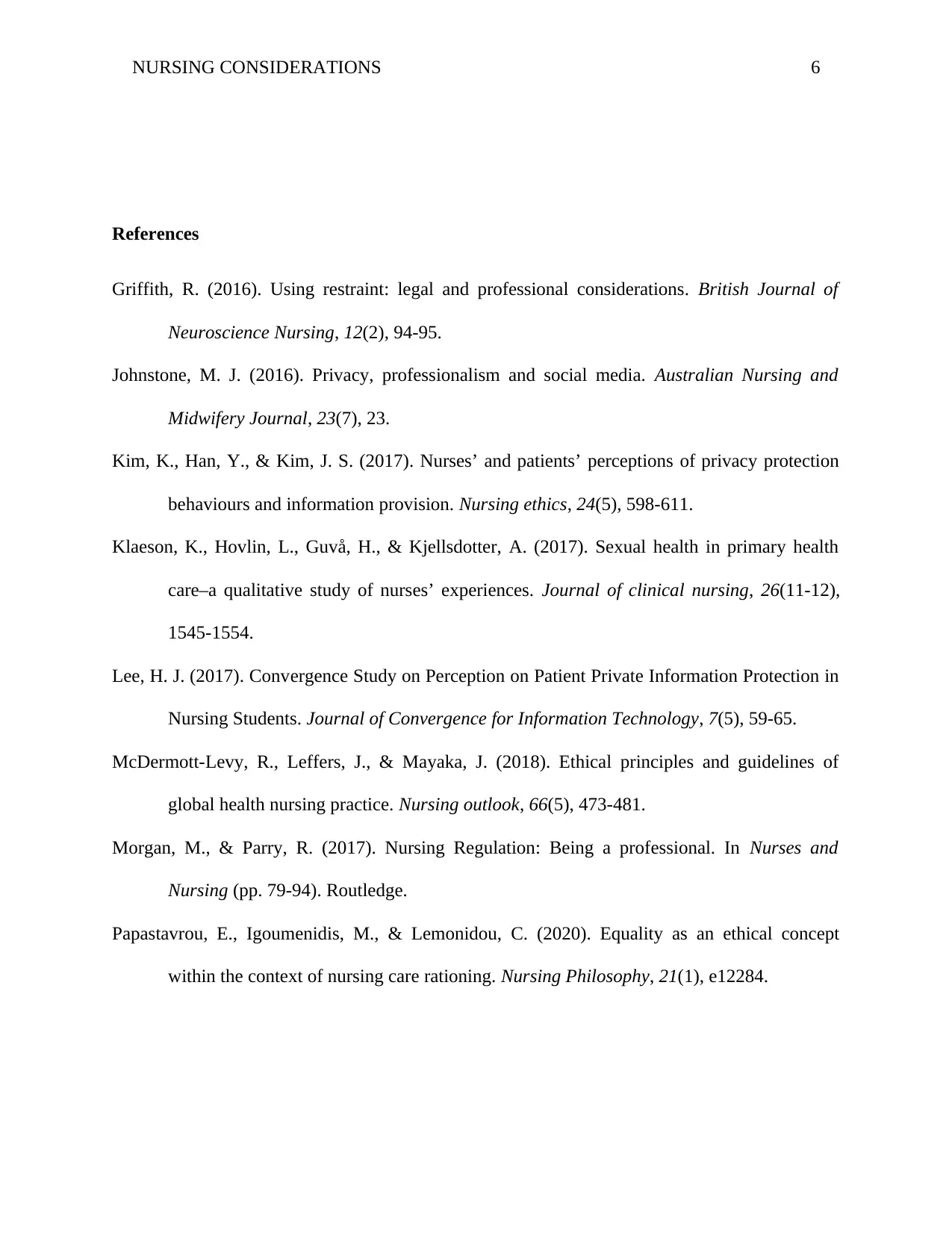
NURSING CONSIDERATIONS 6
References
Griffith, R. (2016). Using restraint: legal and professional considerations. British Journal of
Neuroscience Nursing, 12(2), 94-95.
Johnstone, M. J. (2016). Privacy, professionalism and social media. Australian Nursing and
Midwifery Journal, 23(7), 23.
Kim, K., Han, Y., & Kim, J. S. (2017). Nurses’ and patients’ perceptions of privacy protection
behaviours and information provision. Nursing ethics, 24(5), 598-611.
Klaeson, K., Hovlin, L., Guvå, H., & Kjellsdotter, A. (2017). Sexual health in primary health
care–a qualitative study of nurses’ experiences. Journal of clinical nursing, 26(11-12),
1545-1554.
Lee, H. J. (2017). Convergence Study on Perception on Patient Private Information Protection in
Nursing Students. Journal of Convergence for Information Technology, 7(5), 59-65.
McDermott-Levy, R., Leffers, J., & Mayaka, J. (2018). Ethical principles and guidelines of
global health nursing practice. Nursing outlook, 66(5), 473-481.
Morgan, M., & Parry, R. (2017). Nursing Regulation: Being a professional. In Nurses and
Nursing (pp. 79-94). Routledge.
Papastavrou, E., Igoumenidis, M., & Lemonidou, C. (2020). Equality as an ethical concept
within the context of nursing care rationing. Nursing Philosophy, 21(1), e12284.
References
Griffith, R. (2016). Using restraint: legal and professional considerations. British Journal of
Neuroscience Nursing, 12(2), 94-95.
Johnstone, M. J. (2016). Privacy, professionalism and social media. Australian Nursing and
Midwifery Journal, 23(7), 23.
Kim, K., Han, Y., & Kim, J. S. (2017). Nurses’ and patients’ perceptions of privacy protection
behaviours and information provision. Nursing ethics, 24(5), 598-611.
Klaeson, K., Hovlin, L., Guvå, H., & Kjellsdotter, A. (2017). Sexual health in primary health
care–a qualitative study of nurses’ experiences. Journal of clinical nursing, 26(11-12),
1545-1554.
Lee, H. J. (2017). Convergence Study on Perception on Patient Private Information Protection in
Nursing Students. Journal of Convergence for Information Technology, 7(5), 59-65.
McDermott-Levy, R., Leffers, J., & Mayaka, J. (2018). Ethical principles and guidelines of
global health nursing practice. Nursing outlook, 66(5), 473-481.
Morgan, M., & Parry, R. (2017). Nursing Regulation: Being a professional. In Nurses and
Nursing (pp. 79-94). Routledge.
Papastavrou, E., Igoumenidis, M., & Lemonidou, C. (2020). Equality as an ethical concept
within the context of nursing care rationing. Nursing Philosophy, 21(1), e12284.
⊘ This is a preview!⊘
Do you want full access?
Subscribe today to unlock all pages.

Trusted by 1+ million students worldwide

NURSING CONSIDERATIONS 7
1 out of 7
Related Documents
Your All-in-One AI-Powered Toolkit for Academic Success.
+13062052269
info@desklib.com
Available 24*7 on WhatsApp / Email
![[object Object]](/_next/static/media/star-bottom.7253800d.svg)
Unlock your academic potential
Copyright © 2020–2026 A2Z Services. All Rights Reserved. Developed and managed by ZUCOL.





